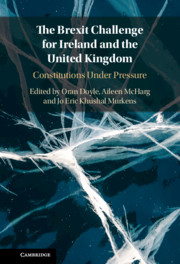Book contents
- The Brexit Challenge for Ireland and the United Kingdom
- The Brexit Challenge for Ireland and the United Kingdom
- Copyright page
- Contents
- Figures
- Tables
- Contributors
- Preface
- The Constitutional Tensions of Brexit
- Part I Territorial Pressures in Ireland and the United Kingdom
- Part II Institutional Pressures and Contested Legitimacy
- Index
The Constitutional Tensions of Brexit
Published online by Cambridge University Press: 17 August 2021
- The Brexit Challenge for Ireland and the United Kingdom
- The Brexit Challenge for Ireland and the United Kingdom
- Copyright page
- Contents
- Figures
- Tables
- Contributors
- Preface
- The Constitutional Tensions of Brexit
- Part I Territorial Pressures in Ireland and the United Kingdom
- Part II Institutional Pressures and Contested Legitimacy
- Index
Summary
The constitutional upheavals occasioned by Brexit can, at one level, be attributed to the way in which the EU referendum was conceived and conducted: the party political rather than constitutional motivation for the referendum; the relatively short and poor quality referendum campaign; the failure to take seriously the implications of a territorially divided result; the lack of planning for how withdrawal would be implemented; and the narrowness of the majority in favour of Leave. These weaknesses may have contributed to a significant absence of ‘losers’ consent’ amongst Remain voters, as well as a lack of realism about the choices and compromises that would need to be made in order to secure a withdrawal agreement. But these essentially procedural factors, important as they were, reflected and exacerbated much deeper tensions within the UK constitutional order. In this introductory chapter, we explore these deeper tensions, identifying four key sources of constitutional unease which have been exposed by Brexit: first, the UK’s fraught relationship with the European Union; second, strained territorial relations within the UK; third, Ireland’s complex relationship with the UK and the contested position of Northern Ireland; and, fourth, developing institutional tensions at the core of the UK constitution.
- Type
- Chapter
- Information
- The Brexit Challenge for Ireland and the United KingdomConstitutions Under Pressure, pp. 1 - 18Publisher: Cambridge University PressPrint publication year: 2021



